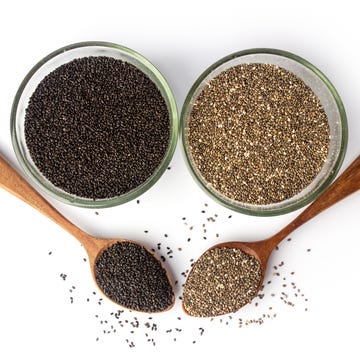The mouth with all its various parts is one of the most sensitive — and useful — parts of the body. It’s where you experience the sublime taste of your favorite gelato and what you use to kiss your baby on the forehead, not to mention where you take care of the crucial functions of breathing and hydrating. So when something goes wrong there, it can be very painful and impact several aspects of your daily life.
That’s why it’s so important to know about stomatitis, inflammation of the mucous lining the mouth, which can affect the tongue, gums, lips, roof, and floor of the mouth. “This inflammation can cause discomfort, redness and swelling, making activities like eating and speaking more difficult,” says Karen Man, DDS, a dentist and owner of SmileGrove Dental in Oakville, Ontario. In addition to sores, blisters and ulcers, stomatitis can cause discoloration of the inner lips, inner cheeks, and tongue, adds Brynna Connor, MD, a family medicine specialist in Austin, TX, and healthcare ambassador at NorthWestPharmacy.com.
Inflammation is the body’s natural response to injury or infection, explains Dr. Man. “When the mucous membranes in the mouth are irritated or damaged, the immune system increases blood flow to the area to promote healing, and this leads to redness and swelling,” she explains. In addition, “chemical mediators released during inflammation can stimulate nerve endings, causing pain or discomfort," she says. "In some cases, ulcers or sores may form. These symptoms are your body's way of signaling that something isn't right.”
Different types of stomatitis
Stomatitis can manifest in different locations and with different symptoms, depending on the cause of the damage. Common types include:
Causes
Anything that irritates the mucosa in the mouth can cause stomatitis. This includes:
- Viruses
- Gum disease
- Irritation from dentures or braces
- Biting your cheek
- Burning your mouth with hot food
- Smoking or chewing tobacco
- Allergic reactions to food
- Excessive alcohol
- Excessive stress
- Hormonal changes due to pregnancy or menopause
- Reaction to certain medications, including chemotherapy and some drugs for rheumatoid arthritis or epilepsy
According to Dr. Man, systemic illnesses such as diabetes, autoimmune diseases and GI disorders such as Crohn’s disease can also manifest in symptoms in the mouth. In addition, some cases of stomatitis may be caused by vitamin deficiencies (such as vitamin B), says Maria Cespedes, DDS, of Edition Dental in Toronto. In some cases, angular cheilitis can a sign of sleep apnea. “There are other reasons why they occur, and deciphering the reason for them must be done on a case-by-case basis because every case is different,” Dr. Cespedes adds.
Is stomatitis ever a sign of systemic inflammation?
“Diseases like inflammatory bowel disease, celiac disease or autoimmune disorders such as lupus can have oral manifestations, including stomatitis. This means that inflammation in the mouth may be connected to inflammation elsewhere in the body. If you're experiencing recurrent mouth sores or inflammation along with other symptoms, it's crucial to consult with your doctor or dentist to explore underlying causes,” says Dr. Man.
Additional signs of inflammation include:
- Swelling: lump, bump or enlarged area
- Redness: discoloration may occur when blood vessels dilate
- Heat: an affected area feels warm when touched
- Pain: can be constant or just when the area is touched
- Loss of function: difficulty moving a joint, an infection in the lungs, immobility
Treatment
Treatment depends on the source of the inflammation. Medications include antivirals, antibiotics, and antifungals to get to the source of the inflammation.
To soothe symptoms, you may use:
- Pain medications such as ibuprofen or acetaminophen
- Antimicrobial mouthwash
- Corticosteroid gels
- Anesthetic rinses
- Salt water rinses
Prevention is also key. “If you’re prone to stomatitis, make sure you’re properly and adequately brushing your teeth, avoiding salty, spicy, and/or acidic foods and avoiding carbonated and caffeinated drinks as well as alcohol,” says Dr. Connor.
Bottom line
“Typically, these conditions aren't dangerous, but they can be incredibly painful," adds Dr. Cespedes. "They can fade on their own, but the pain could be enough to send you to a doctor or dentist."
Eric M. Ascher, D.O. is a board-certified family medicine physician. He completed medical school at the New York College of Osteopathic Medicine, his family medicine residency and fellowship at Northwell Health, and has been working for Northwell Health since. Dr. Ascher practices in New York City and focuses on preventative medicine and healthy lifestyles. He has been recognized annually on The Super Doctor’s List posted in the New York Times and has been recognized by Northwell Health as a Rising Star and Physician of the Year. He hosts a series on YouTube in collaboration with Northwell Health called “Hack Your Health,” where viewers are taught why household items may relieve their ailments. Dr. Ascher is an assistant professor of the Zucker Hillside School of Medicine at Hoftsra Northwell, has been a pioneer for telehealth throughout his career, has been a media expert, and is heavily involved in practice and technology optimization. He appreciates building relationships with his patients and their families to encourage long, happy, and healthy lives.












